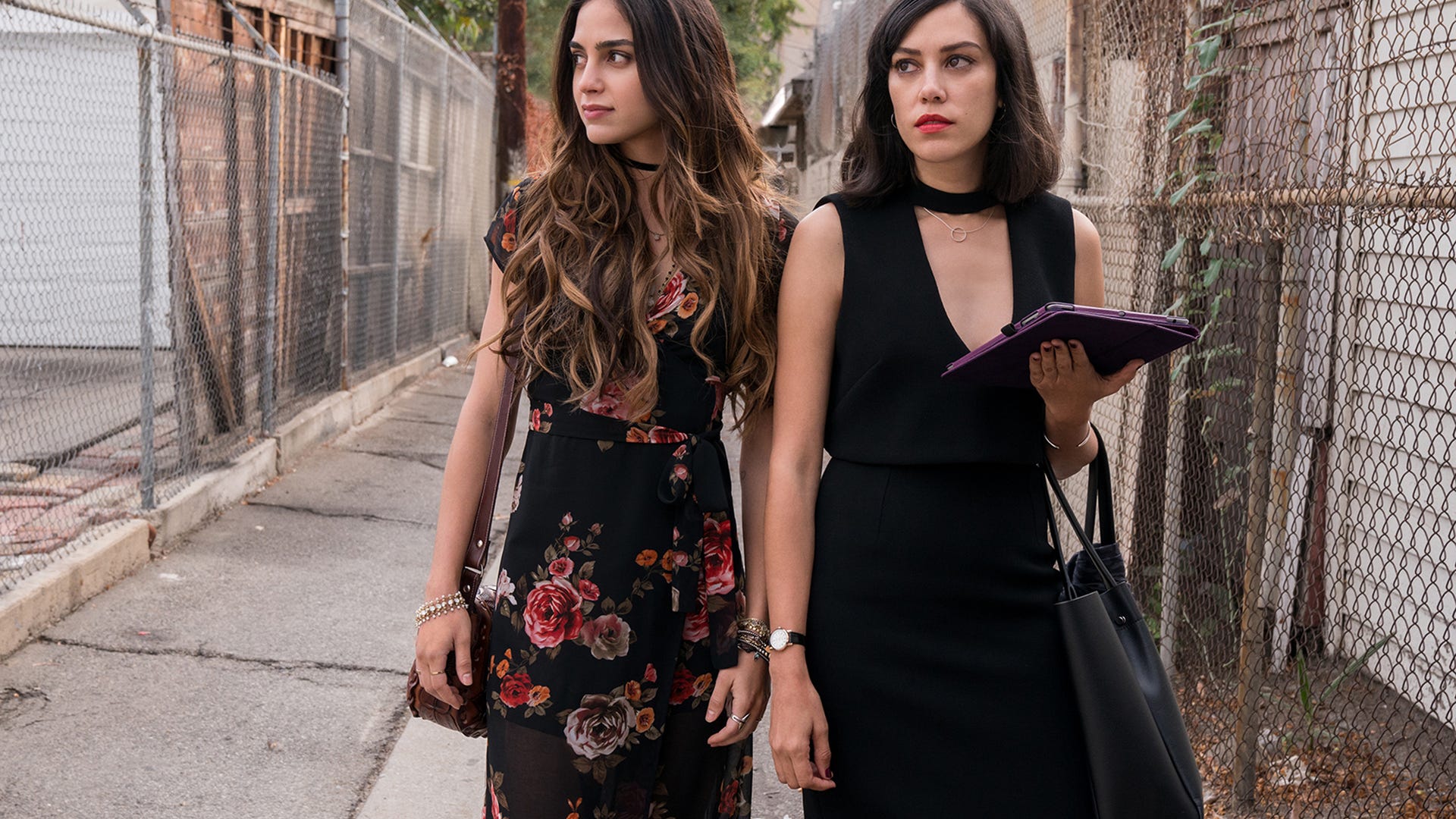Join or Sign In
Sign in to customize your TV listings
By joining TV Guide, you agree to our Terms of Use and acknowledge the data practices in our Privacy Policy.
Vida Ends the Silence of the Queer Latinx Community
Exploring a whole new side of East L.A.
Vida, Starz's series about two Mexican-American sisters dealing with their mom's sudden passing, does and says a lot in six episodes. It explores the roots of tension between between Emma Hernandez (Mishel Prada) and Lyn (Melissa Barrera). It offers a glimpse into East L.A. -- known globally as a physical and symbolic hub of Latinx and Chicanx culture. It shines a light on gentrification too, and on top of that, it's unapologetically queer -- a radical rejection of silence in the Latinx community that makes Vida vital TV.
Showrunner Tanya Saracho -- up until now a playwright -- crafted a six-episode series with Latinx queer people at the center of the story and behind it, since she took care to ensure Vida is staffed with writers and directors who're also Latinx. As a result, Vida cracks with authenticity as it undoes generations of silence about sexual orientation and gender identity.
Watch Vida's Cast Members Share Their Favorite Curse Words
The drama starts when the tough, corporate cannibal Emma comes home to East L.A. from Chicago to assist in managing her mother's estate, or lack thereof. Back in the decidedly unglamorous environment she grew up in, she's forced to lean on the slightly messy Lyn to figure out what to do with Vidalia's run-down pub. Emma soon discovers that doesn't know her family as well as she thought -- especially when she learns that the person who's been minding the bar, Vida's roommate Eddy (Ser Anzoategui) is not at all her roommate but her mom's domestic partner. Queer herself, Emma's plan was to hightall it out of L.A. ASAP, but as she wades through her mom's affairs she's stuck with the bar, her flighty sister, plus the stranger who's now her in-law as she confronts her own past. "Emma," Mishel Prada told TV Guide, "comes back to her neighborhood and keeps running into mirrors -- things she doesn't like about herself, and Eddy is the incarnation of everything that got her sent away."

Mishel Prada, Melissa Barrera and Ser Anzoategui, Vida
Erica Parise, StarzThere's a dearth of content about Mexican-American life on TV in general, which is partly why Vida's arrival feels so urgent. As it unpacks Emma's unpleasant history with her mother -- and shows her, and other characters, having lots of hot sex -- viewers happily fall into a universe that humanizes Latinx and Mexican-Americans but also fights taboos within the community that haven't been addressed on TV. Saracho and stars of the show say that Latinx culture, influenced by Catholicism, the Jehovah's Witness faith, as well as machismo, has long swept Latinx LGBTQ people under the rug. Vida's rich stories reveal the insecurities, fears and difficult pasts of Emma and her extended family, disrupting queer invisibility in diaspora communities by letting its complicated characters into viewers' hearts. "I really wanted to normalize our female brown queerness," Saracho told TV Guide. "We're not explaining anything." They're not apologizing either.
Ser Anzoategui, the non-binary actor who plays the immensely lovable Eddy, spent considerable time growing up in East L.A. before being cast in Vida, and says Eddy's presence sheds light on aspects of the Latinx queer experience not many people know about. "It makes me feel good to play Eddy," Anzoategui says. "I understood the role on a very deep level. There are so many hurdles to being non-binary; it's about navigating it and developing a spirit that says you cannot be broken and continue to be resilient." Anzoategui might be the best example of the way Vida illuminates experiences not often talked about: as a person who doesn't identify with any specific gender, they (their preferred pronoun) show how people like Eddy can be ostracized. Anzoategui, a long-time performer and artist based in East L.A., says they endured bouts of poverty due in part to limited job options; as a former food server/bartender themself, Anzoategui pointed out that Vida's bar is important because it's a place where folks don't have to hide or apologize for who they are. It is a place that would actually hire Eddy, as opposed to bars that use female sexuality to sell men drinks.

Melissa Barrera and Mishel Prada, Vida
Erica Parise, StarzAnzoategui cites Juan Gabriel, the Latinx singer who died in 2016 as an example of the silence queer Latinx people have endured and maintained for generations. Though he was assumed to be gay and hinted at it in his later years, he lived 66 years without ever publicly acknowledging his sexuality in spite of being a queer Latinx icon. "There's this thing," Anzoategui says of the community, "where you just don't talk about it."
With Vida, those voices are silenced no more. Although fighting the gentrification that threatens Emma and Lyn's neighborhood, as well as the discrimination and physical danger Latinx people and families face in 2018, Vida stands firm in asserting that queer Latinx stories matter just as much. "It's time for us to have those conversations and accept each other -- to not make us feel like we're wrong for being in love," Prada says. "With Emma, you see what happens when [people are] shamed for who they are, the damaging effects. That's why important to be part of this -- to remove the shame and taboo welcome people in the world."
Vida premieres Sunday, May 6 at 7:30 p.m. on Starz.
